I Remember Viola Luizzo And I Hope
I Mourn Her And The Demise Of The Voting Rights Act For Which She Died
“The past is never dead. It’s not even past. All of us labor in webs spun long before we were born, webs of heredity and environment, of desire and consequence, of history and eternity.”
―William Faulkner, Requiem for a Nun.
The Voting Right Act of 1965, one of the most important civil rights cases in history, was gutted a decade ago by the United States Supreme Court in Shelby County v. Holder (2013).
Among other things, Shelby County struck down the “pre-clearance requirements” that would have prevented the types of election tampering attempted in Georgia.
If the Voting Rights Act was still in effect in 2024, the Georgia State Election Board would have been forced to petition the US Justice Department before it could have created a rule indefinitely delaying certification of the presidential election results until a “hand count” was completed.
Such a petition, if made, would have never been granted because, as explained here, such a rule is beyond the statutory authority of a ministerial agency. Although the Georgia courts struck down the rule, it is just one of many hard blows at the legal foundation of our election systems.
A second Trump Administration would remove remaining barriers to authoritarianism and allow him to make good on his promise that "in four years, you don't have to vote again. We'll have it fixed so good, you're not gonna have to vote."
Donald Trump didn’t come out of nowhere. Fascism, under the cover of nationalism, has always been with us. Trump and his legal supporters have merely exploited a decades-long legal attack on the Constitutional foundation of our democracy highlighted by Shelby County and the demise of the Voting Rights Act.
If Trump is defeated and the American republic continues, a second Voting Rights Act could be enacted with the passage of the John Lewis Voting Rights Advancement Act, restoring the pre-clearance requirement and rebuilding our rotting democratic electoral foundation.
A generation ago, people like Viola Luizzo fought and died for the Voting Rights Act. To paraphrase Faulkner, her sacrifice isn’t past but rather a call to justice for us to honor today.
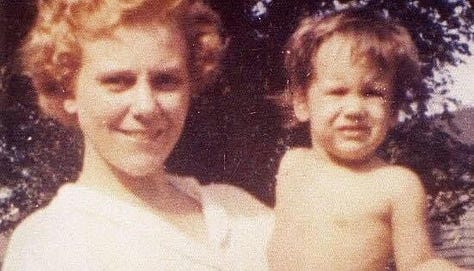
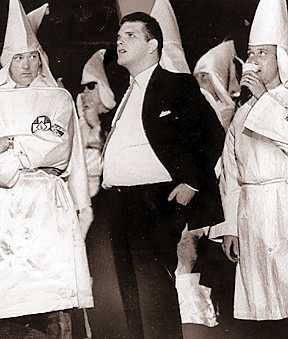
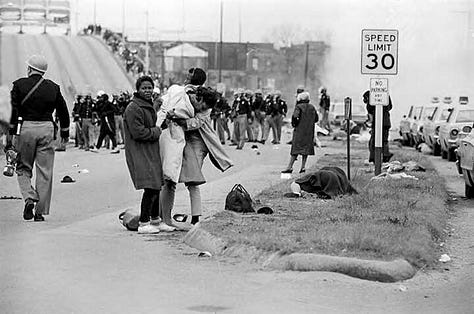
The Murder of Viola Liuzzo
In 1965, Viola Liuzzo, was 39 years old and a mother of five. She was inspired to drive the 800 miles from her Detroit home to Selma, Alabama after witnessing televised footage of hundreds of peaceful protestors being clubbed and tear-gassed by police on the Edmund Pettus Bridge on March 7, 1965. She explained to her husband “it’s everybody’s fight,” and kissed her children goodbye.
For five days, Liuzzo worked for the Southern Christian Leadership Conference‘s (SCLC) transportation service ferrying marchers between Selma and Montgomery. On March 25, she was driving 19-year-old Leroy Moton, an African American, to Montgomery, when a car carrying four KKK members began chasing them.
The Klan car pulled alongside Liuzzo’s and one of the gunmen in the Klan car shot her in the head, killing her instantly. Moton was not hit and survived by playing dead. During the trial, each of the defendants claimed the others fired the kill shot; the fourth, Gary Thomas Rowe, testified with immunity as an FBI informant.
During the trial, the defense attorney, who was also “Grand Klonsel” of the United Klans of America, informed the jury that since Rowe had broken his Klan loyalty oath by testifying against his fellow Klansmen, they should not believe anything he said. Further, he argued, Liuzzo was a white woman alone in a car with a black man at night and whatever happened to her was her own fault.
An all-white jury acquitted the defendants of Liuzzo’s murder.
The United States Attorney General’s Report on Gary Thomas Rowe can be found here.
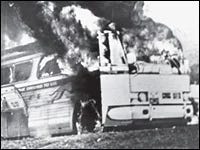
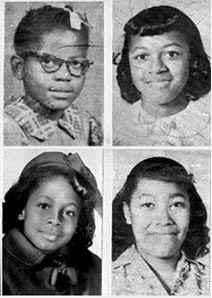
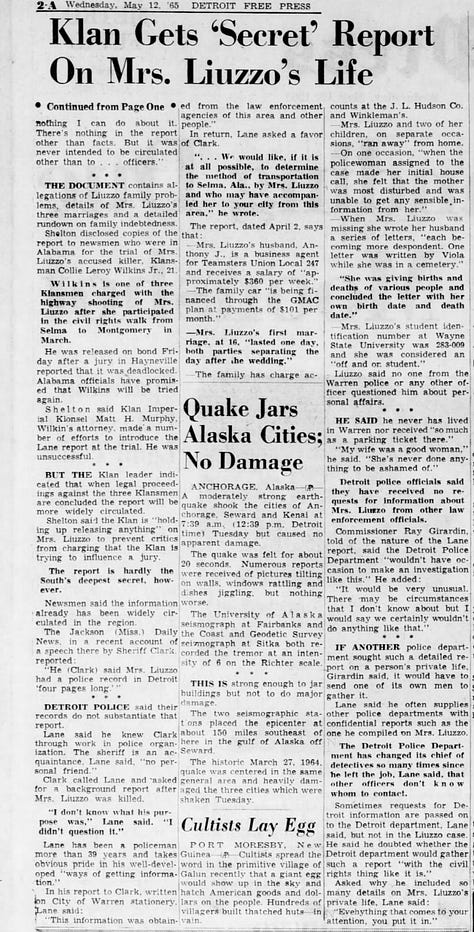
The Posthumous Slander and Humiliation of Viola Liuzzo by Police and the FBI
Prior to the Liuzzo murder and while on the FBI’s payroll, Rowe participated in the attack of a “Freedom Bus” in 1961 and the September 15, 1963 Birmingham 16th Street Baptist Church bombing, which killed four girls.
Concerned that his involvement in the murders would be made public, FBI Director J. Edgar Hoover deflected the focus of the national news coverage from the FBI to Liuzzo’s motivation for joining the march, referring to her as an “outside agitator,” leaking disinformation portraying her as “unstable,” and accusing her of “abandoning her family.”
Selma Sheriff Jim Clark obtained and disseminated disinformation, the “Lane Report.” The Report, bolstered by J. Edgar Hoover, portrayed Mrs. Liuzzo as a “drug-taking, middle-aged adulteress with a black teenage lover.”
When the other KKK members in the car carrying the murderers were subpoenaed to testify in a civil rights trial, they insisted that Rowe had shot Liuzzo. Both passed lie-detector tests, and two Birmingham police officers later admitted that Rowe had also bragged to them that he’d killed Liuzzo.
In December 1977, the family filed a $2 million negligence claim against the federal government, charging that the FBI knew that Rowe and his fellow Klansmen were planning violence on March 25, 1965, and by doing nothing to prevent it had effectively conspired in her murder.
In September 1978, Rowe was indicted for first-degree murder. Government attorneys, however, successfully moved to dismiss the charge based on his 1965 immunity.
The redacted FBI file on Viola Liuzzo can be found here.
The Voting Rights Act
Liuzzo’s murder helped galvanize support for the 1965 Voting Rights Act. Five days after her death, Martin Luther King, Jr., John Lewis, and Jimmy Hoffa attended her funeral in Detroit, creating a wave of national support for the Voting Rights Act which had been stalled in Congress. The VRA passed on August 4, 1965.
I have fought voter disenfranchisement in the courts and I have taught voting rights at law school. I have watched as the Supreme Court gutted the VRA and states re-enacted Jim Crow Era voter suppression of minorities, students, the elderly, and the poor. As I have written in this space, an ascendant, white supremacist MAGA movement carries on the KKK’s insidious work.
I am frightened for our nation. Bilious hate has replaced dialogue in our legislatures and a Neo-Confederacy is forming around a vulgar cult of personality.
When I am at my lowest point the image of a loving mother flickers, unbidden, to mind.
I remember Viola Liuzzo. I remember this is everyone’s fight.




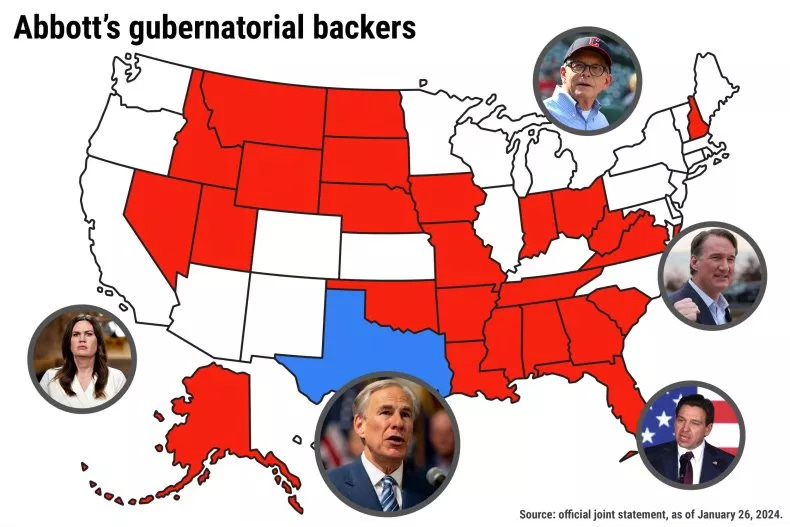
I believe she was a UU